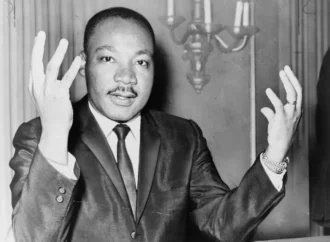Assuming too much in politics can lead to disappointing results and gut-wrenching betrayals.
Nowhere is this more clear than with the Second Amendment. Many inexperienced activists who get involved in Second Amendment causes and other wedge issues—from abortion to immigration—learn this the hard way when they automatically assume Republicans are on their side. This assumption has resulted in numerous disappointments for grassroots conservatives who desire genuine reforms. It cannot be stressed enough: The notion that Republicans are a lock to support the Second Amendment is not supported by history.
Republican flimsiness on the Second Amendment started several decades ago, an example being George H. W. Bush’s signing of the 1990 Gun-Free School Zones Act into law. The passage of this bill effectively turned schools nationwide into criminal safe spaces by banning law-abiding citizens from possessing or carrying firearms within one thousand feet of private, public, or parochial elementary and secondary schools.
Gun-free zones are anything but safe. Between 2014 and 2019, 73 percent of mass public shootings where four or more people were killed took place in “gun-free zones,” according to a 2021 study by former U.S. Department of Justice Senior Advisor Dr. John Lott, Jr.
During the time when gun-free zones were first rolled out, the now well-known Democratic Socialist Bernie Sanders squared off against Republican incumbent Peter Smith for Vermont’s at-large congressional district in 1990. Interestingly, Sanders received an endorsement from the National Rifle Association: “Bernie Sanders is a more honorable choice for Vermont sportsmen than Peter Smith.” Sanders even voted against the National Instant Criminal Background Check System (NICS), created by the 1993 Brady Handgun Bill, while 56 Republicans voted in favor of this system. Republicans continue to foolishly defend unconstitutional background checks that do little to curb crime.
Due to pressure following the Las Vegas massacre of 2017, the Trump administration flinched by passing Fix NICS, a notable expansion of gun control amending the Brady Act. Under Fix NICS, state governments are compelled to share records with the federal government allegedly to streamline the background check process.
In essence, this Republican-backed legislation just threw more money at a system that is both unconstitutional and ineffective in battling crime. NICS has had a miniscule effect on crime rates, as the aforementioned Lott demonstrates in his seminal text, More Guns, Less Crime. In fact, Lott found that crime had actually been decreasing before NICS became law in 1994.
The Trump administration’s decision to implement a ban on bump stocks was also troubling. While bump stocks, which enable rifles to fire like a machine gun, are not exactly the most popular firearm accessory, the precedent that the Trump administration set could potentially be exploited by future leftist governments who will not hesitate to use agencies like the Bureau of Alcohol, Tobacco, Firearms and Explosives to infringe upon Americans’ right to bear arms.
Overall, federal governance doesn’t have much to offer gun owners. However, at the state level, a treasure trove of opportunities awaits those who value the Second Amendment.
Constitutional Carry, the simple concept that any lawful individual should be allowed to carry a firearm without having to ask the government for permission, has been one of the most successful movements on the right, as I wrote in a 2020 Chronicles article. Some may get the impression that the Constitutional Carry movement is the exclusive product of Republican Party efforts. But such an assumption ignores the insurgent grassroots activity that put this legislation on the map.
Republicans were traditionally aloof, if not hostile, towards Constitutional Carry in its embryonic stages. Even Republican Governors have capsized popular grassroots Constitutional Carry legislation, one case being South Dakota Gov. Dennis Daugaard, who vetoed such legislation in 2012 and 2017. Thus, an “R” beside a politician’s name does not guarantee that he will support a basic, Republican-oriented issue such as the Second Amendment. In fact, if there’s one guarantee in politics, it’s that trusting in the implied stances of politicians rhetoric, rather than in their voting behavior, is a recipe for betrayal.
The good news is that Second Amendment activists have taken note of this frequent betrayal and adeptly passed Constitutional Carry in numerous legislatures. The numbers speak for themselves. For example, when President Barack Obama assumed office in 2009, there were only 2 Constitutional Carry states (Alaska and Vermont). As of 2021, there are 21, with more states likely to follow suit in the next five years.
The Constitutional Carry movement itself has demonstrated how factions within the Republican Party can be propelled, via grassroots pressure, to move forward legislation that would never even be on the legislative radar in Washington. It also serves a reminder that Beltway politics isn’t the only game in town. There are plenty of opportunities at lower levels of government where average individuals can change public policy and build genuine resistance against the radical left.
We have a federalist system for a reason.
Let’s use it.
—
















Leave a Comment
Your email address will not be published. Required fields are marked with *